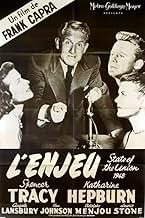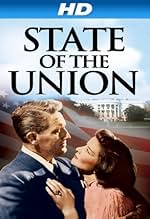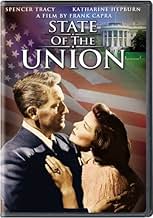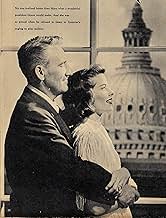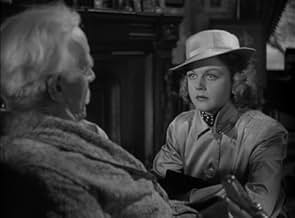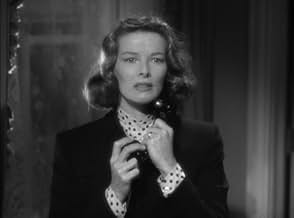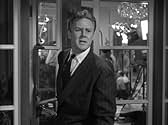IMDb-BEWERTUNG
7,2/10
4503
IHRE BEWERTUNG
Füge eine Handlung in deiner Sprache hinzuAn industrialist is urged to run for President, but this requires uncomfortable compromises on both political and marital levels.An industrialist is urged to run for President, but this requires uncomfortable compromises on both political and marital levels.An industrialist is urged to run for President, but this requires uncomfortable compromises on both political and marital levels.
- Auszeichnungen
- 3 Gewinne & 1 Nominierung insgesamt
Georgie Nokes
- Grant Matthews Jr.
- (as George Nokes)
Empfohlene Bewertungen
This somewhat forgotten 1948 dramedy is not the undiscovered gem of the Tracy-Hepburn pairings, but the 2006 DVD provides an opportunity to take a look at the political corruption running rampant in Washington at the time, clearly as prescient now as it was relevant then. The subject is well suited to film-making legend Frank Capra, who made the classic "Mr. Smith Goes to Washington" a decade earlier and echoes a similar theme of an honest man surrounded by those who tear at his ethics. Adapted by Anthony Veiller and Myles Connolly from a play by Russel Crouse and Howard Lindsay, the plot centers on Grant Matthews, a pulled-from-his-bootstraps industrialist who has not lost touch with the common folks, a quality seized upon by Machiavellian newspaper publisher Kay Thorndyke, who uses her considerable media power to shape him into a viable candidate for the presidency.
Thorndyke also happens to be Matthews' lover, even though he is still married to stoic, disillusioned Mary, his estranged wife who has remained in the marriage not only for the sake of their two children but also in the dimming hope that he will come back to her. Initially, Matthews balks at the idea of becoming President, but he recognizes an ambition to improve the country. At the same time, Thorndyke and her cohort, proto-Karl Rove political adviser Jim Conover convince him to make compromising speeches to win the votes of powerful lobbies. If you know Capra films, you know how it will all turn out. The main problem I had with the film is the pacing and the relative inconsistency in tone. Much of the time, it feels truncated with little transition between scenes, and farcical moments are mixed with more serious ones in ways that make the film feel emotionally askew at times.
The performances can't be faulted. Spencer Tracy is well cast as the plainspoken Matthews, while Katharine Hepburn lends her much-needed verve and snap to the cautiously hopeful Mary. All of 22 but looking far more commanding and mature, Angela Lansbury almost steals the picture as Kay, even though her character is so venal and humorless that it is hard not to hiss when she's on screen, especially with her dragon-lady cigarette holder. It's easy to see the future Mrs. Iselin in John Frankenheimer's "The Manchurian Candidate". Adolphe Menjou plays Conover in his typical blowhard manner, while Van Johnson is unctuous in a likable sort of way as reporter Spike McManus. Capra lays out his familiar flag-waving cornpone thickly here, sometimes quite effectively, but the attempts at slapstick humor are pretty laborious. This remains an interesting curio in his canon. The DVD provides a fairly clean print but has absolutely no extras, not even chapter stops.
Thorndyke also happens to be Matthews' lover, even though he is still married to stoic, disillusioned Mary, his estranged wife who has remained in the marriage not only for the sake of their two children but also in the dimming hope that he will come back to her. Initially, Matthews balks at the idea of becoming President, but he recognizes an ambition to improve the country. At the same time, Thorndyke and her cohort, proto-Karl Rove political adviser Jim Conover convince him to make compromising speeches to win the votes of powerful lobbies. If you know Capra films, you know how it will all turn out. The main problem I had with the film is the pacing and the relative inconsistency in tone. Much of the time, it feels truncated with little transition between scenes, and farcical moments are mixed with more serious ones in ways that make the film feel emotionally askew at times.
The performances can't be faulted. Spencer Tracy is well cast as the plainspoken Matthews, while Katharine Hepburn lends her much-needed verve and snap to the cautiously hopeful Mary. All of 22 but looking far more commanding and mature, Angela Lansbury almost steals the picture as Kay, even though her character is so venal and humorless that it is hard not to hiss when she's on screen, especially with her dragon-lady cigarette holder. It's easy to see the future Mrs. Iselin in John Frankenheimer's "The Manchurian Candidate". Adolphe Menjou plays Conover in his typical blowhard manner, while Van Johnson is unctuous in a likable sort of way as reporter Spike McManus. Capra lays out his familiar flag-waving cornpone thickly here, sometimes quite effectively, but the attempts at slapstick humor are pretty laborious. This remains an interesting curio in his canon. The DVD provides a fairly clean print but has absolutely no extras, not even chapter stops.
`Is there any difference between Democrats and Republicans?' `The difference is that they're in and we're out.' -- A line from State of the Union, one of only a handful of political films to use direct partisan language.
Based on a 1945 play by Howard Lindsay and Russell Crouse, State of the Union marked Frank Capra's return to the political genera. This film is also the third of nine pictures featuring Spencer Tracey and Katharine Hepburn. In this outing, Tracey plays Grant Matthews, a famous aircraft tycoon courted by the Republican Party to become their candidate for President of the United States. The film's title, in addition to referring to the country, is also a metaphor for Matthews' relationship with his wife, Mary (Hepburn). The two are having marital problems sparked by Matthews' affair with a newspaper heir Kay Thorndyke (played by a 22-year-old Angela Lansbury convincingly portraying a woman in her forties).
Once the campaign is underway, the classic theme of a good man sacrificing his ideals in order to win begins to surface. Matthews' speeches are reworked as to not offend any big political establishments (e.g. big business, labor, agriculture, etc.), and soon he begins to loose his own voice along with his identity. Finally, in the film's climax, Matthews is forced to choose between a certain nomination for the presidency or a wife who represents his true character.
Incidentally, for a movie centered on a republican character, State of the Union does not focus on a conventional conservative theme, nor does it only target liberals. The film ribs big business, `the American Dream is not about making money,' in addition to labor. And even though Harry S Truman is the subject of several quips, he was said to have really enjoyed the film, often playing it on his presidential yacht.
At the box office, State of the Union performed better in smaller outlets than large markets. It premiered at New York's Radio City Music Hall to a opening week of $137,000, `this is a bit under hopes, especially in view of intensive advance campaign and strong reviews,' reported Varitey. In Los Angeles, the film opened at No. 1 with $52,000 but `not a smash.' Though in markets such as Minneapolis, Kansas City and Seattle, the film pulled big numbers. Overall the film was a success, but it did not match the box office bounty of Capra's earlier films including Mr. Smith Goes to Washington or the other Tracey/Hepburn parings for that matter (e.g. Adam's Rib, Pat & Mike, Guess Who's Coming to Dinner).
Based on a 1945 play by Howard Lindsay and Russell Crouse, State of the Union marked Frank Capra's return to the political genera. This film is also the third of nine pictures featuring Spencer Tracey and Katharine Hepburn. In this outing, Tracey plays Grant Matthews, a famous aircraft tycoon courted by the Republican Party to become their candidate for President of the United States. The film's title, in addition to referring to the country, is also a metaphor for Matthews' relationship with his wife, Mary (Hepburn). The two are having marital problems sparked by Matthews' affair with a newspaper heir Kay Thorndyke (played by a 22-year-old Angela Lansbury convincingly portraying a woman in her forties).
Once the campaign is underway, the classic theme of a good man sacrificing his ideals in order to win begins to surface. Matthews' speeches are reworked as to not offend any big political establishments (e.g. big business, labor, agriculture, etc.), and soon he begins to loose his own voice along with his identity. Finally, in the film's climax, Matthews is forced to choose between a certain nomination for the presidency or a wife who represents his true character.
Incidentally, for a movie centered on a republican character, State of the Union does not focus on a conventional conservative theme, nor does it only target liberals. The film ribs big business, `the American Dream is not about making money,' in addition to labor. And even though Harry S Truman is the subject of several quips, he was said to have really enjoyed the film, often playing it on his presidential yacht.
At the box office, State of the Union performed better in smaller outlets than large markets. It premiered at New York's Radio City Music Hall to a opening week of $137,000, `this is a bit under hopes, especially in view of intensive advance campaign and strong reviews,' reported Varitey. In Los Angeles, the film opened at No. 1 with $52,000 but `not a smash.' Though in markets such as Minneapolis, Kansas City and Seattle, the film pulled big numbers. Overall the film was a success, but it did not match the box office bounty of Capra's earlier films including Mr. Smith Goes to Washington or the other Tracey/Hepburn parings for that matter (e.g. Adam's Rib, Pat & Mike, Guess Who's Coming to Dinner).
This is an outstanding movie that belongs in the standard viewing repertoire of great movies from the 1940's. There is a reason this movie is not so well known. It was obviously filmed as a big MGM production (you can hear the lion's roar on the soundtrack!) that became owned by Frank Capra's Liberty Films. The script is very intelligent and demonstrates a knowing cynicism of the political world, but much more believable and less sentimental than Mr. Smith or other Capra films. Most people have seen only a few Tracy-Hepburn movies. Hopefully with Hepburn's recent passing the rights owner will produce a digitally restored DVD with background explaining the history and perspective of this seldom seen classic.
10stphifer
This is my favorite Tracy-Hepburn film and one of my favorite Frank Capra films. I recommend reading Capra's out-of-print biography, "The Name Above the Title" for the interesting story of the reaction to this film by official Washington in 1948.
Quite reminiscent of "Meet John Doe," the story tests the character of a man against the political power-brokers who want to use him for their own purposes. Ideals battle pragmatism in ways that still ring true 50+ years later.
Angela Landsbury is a wicked woman (can we call her a fem fa tale?) in an amazing performance foreshadowing her role in 1962's "Manchurian Candidate." Adolphe Menjou's sleazy political boss is about a greasy as they come.
All in all there is nothing like a Capra film to make me what to stick to my principles and listen to the people who really love me. Add to Capra's theme of the inherent wisdom of the people this first rate group of actors and you have two hours of time well spent.
Quite reminiscent of "Meet John Doe," the story tests the character of a man against the political power-brokers who want to use him for their own purposes. Ideals battle pragmatism in ways that still ring true 50+ years later.
Angela Landsbury is a wicked woman (can we call her a fem fa tale?) in an amazing performance foreshadowing her role in 1962's "Manchurian Candidate." Adolphe Menjou's sleazy political boss is about a greasy as they come.
All in all there is nothing like a Capra film to make me what to stick to my principles and listen to the people who really love me. Add to Capra's theme of the inherent wisdom of the people this first rate group of actors and you have two hours of time well spent.
State of the Union (1948)
*** (out of 4)
Political drama from Capra has an honest Grant Matthews (Spencer Tracy) being selected to run for President but soon his honest ways are thrown out by a newspaper woman (Angela Lansbury) and a political spinner (Adolphe Menjou). The two of them plan on riding him into the White House but his wife (Katharine Hepburn) begins to have second thoughts on what their turning her husband into. Of all the Tracy/Hepburn teamings this one here is probably the least known, which is a little bit surprising considering Capra directed it and the wonderful supporting cast but on second thought it might be understandable as this isn't the typical film that they'd appear in together. The movie features some terrific performances but a few questionable bits a comedy keep it from being a bigger hit. There were some scenes that I would have left on the cutting room floor including an extremely silly sequence where plane-tag is played. With a few more of the comedic moments edited out you would have been left with a major hit but as is this film still manages to be quite powerful. What really makes the film go is Hepburn and it's funny to learn she got the role by accident after another actress pretty much walked off after certain demands of hers couldn't be met. Hepburn steals the film from Tracy as she really digs in and gives the movie all of its heart and soul and I think the actress really should get this film mentioned more when people discuss her wonderful career. Tracy is once again Tracy meaning that he turns in the expected great performance. The supporting cast includes nice work from Lewis Stone, Van Johnson, Charles Dingle and even Carl "Alfafa" Switzer in a small role. Menjou and Lansbury are very good in their supporting roles of what would turn out to be good villains. Capra pretty much handled this type of material earlier in MR. DEEDS GOES TO TOWN and MR. SMITH GOES TO WASHINGTON but he makes it all seem fresh again here. The ending has a nice punch to it even though you'll certainly see it coming from a mile away. It's rather funny to see how political movies from the 1930s and 40s still hold up perfectly well today but then it's rather sad to see how nothing much has changed in the political world.
*** (out of 4)
Political drama from Capra has an honest Grant Matthews (Spencer Tracy) being selected to run for President but soon his honest ways are thrown out by a newspaper woman (Angela Lansbury) and a political spinner (Adolphe Menjou). The two of them plan on riding him into the White House but his wife (Katharine Hepburn) begins to have second thoughts on what their turning her husband into. Of all the Tracy/Hepburn teamings this one here is probably the least known, which is a little bit surprising considering Capra directed it and the wonderful supporting cast but on second thought it might be understandable as this isn't the typical film that they'd appear in together. The movie features some terrific performances but a few questionable bits a comedy keep it from being a bigger hit. There were some scenes that I would have left on the cutting room floor including an extremely silly sequence where plane-tag is played. With a few more of the comedic moments edited out you would have been left with a major hit but as is this film still manages to be quite powerful. What really makes the film go is Hepburn and it's funny to learn she got the role by accident after another actress pretty much walked off after certain demands of hers couldn't be met. Hepburn steals the film from Tracy as she really digs in and gives the movie all of its heart and soul and I think the actress really should get this film mentioned more when people discuss her wonderful career. Tracy is once again Tracy meaning that he turns in the expected great performance. The supporting cast includes nice work from Lewis Stone, Van Johnson, Charles Dingle and even Carl "Alfafa" Switzer in a small role. Menjou and Lansbury are very good in their supporting roles of what would turn out to be good villains. Capra pretty much handled this type of material earlier in MR. DEEDS GOES TO TOWN and MR. SMITH GOES TO WASHINGTON but he makes it all seem fresh again here. The ending has a nice punch to it even though you'll certainly see it coming from a mile away. It's rather funny to see how political movies from the 1930s and 40s still hold up perfectly well today but then it's rather sad to see how nothing much has changed in the political world.
Wusstest du schon
- WissenswertesClaudette Colbert was originally cast to play Mary Matthews. A few days before production began, Producer and Director Frank Capra fired her from this movie because she refused to work into the evening. Capra then hired Katharine Hepburn on Spencer Tracy's suggestion.
- PatzerKatharine Hepburn's name is misspelled in the opening credits as "Katherine". This is the result of the original MGM opening credits (MGM was the original theatrical distributor) being replaced by haphazardly-designed replacement credits when MGM's distribution rights expired.
- Zitate
Mary Matthews: Oh, that's silly. No woman could ever run for President. She'd have to admit she's over 35.
- Crazy CreditsWhen this film was reissued, new titles and credits were printed. The original end cast listing was retained, so the cast names which are misspelled in the reissue's opening credits are spelled correctly in the closing cast list.
- VerbindungenFeatured in MGM: When the Lion Roars (1992)
Top-Auswahl
Melde dich zum Bewerten an und greife auf die Watchlist für personalisierte Empfehlungen zu.
- How long is State of the Union?Powered by Alexa
- What was the criticle reception to the film in the late 1940s?
Details
Box Office
- Budget
- 2.600.000 $ (geschätzt)
- Laufzeit2 Stunden 4 Minuten
- Farbe
- Seitenverhältnis
- 1.37 : 1
Zu dieser Seite beitragen
Bearbeitung vorschlagen oder fehlenden Inhalt hinzufügen




